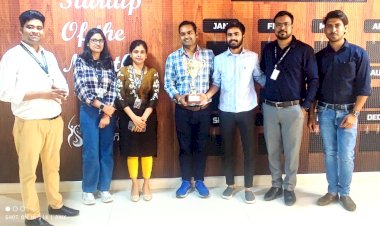Being a Registered MSME in India Has Its Advantages
Many economists have stated that small and medium-sized businesses are the backbone of the economy. The MSME sector employs over 45 percent of India's entire industrial workforce. They are entitled to certain benefits as a result of their registration as an MSME/SSI. Registered MSMEs/SSIs are eligible for a 1% interest rate reduction on overdrafts. They are also eligible for subsidies on industrial promotion expenditures.

In a growing country like India, Micro, Small, and Medium Enterprises ('MSME') play a critical role. Many economists have stated that small and medium-sized businesses are the backbone of the economy. The MSME sector employs over 45 percent of India's entire industrial workforce, produces approximately 50 percent of the country's total exports, and employs almost 95 percent of the country's total industrial units, producing around 6000 different goods. The rise of MSMEs helps the country's economy as a whole to flourish and prosper. The Micro Small and Medium Enterprises Development Act, 2006 ('MSMED Act') governs registrations and applications for businesses in manufacturing and services. The MSMED Act became effective on October 2, 2006. It was created with the goal of promoting, facilitating, and developing MSMEs.
While the rest of the globe is hurting from the effects of the present Coronavirus pandemic, India and Indian businesses have been hit particularly hard. To deal with the repercussions of the pandemic-induced lockdown and keep their businesses viable, even huge enterprises and established companies have been obliged to take drastic cost-cutting measures. Smaller enterprises, such as MSMEs, must be in a difficult situation. In order to survive this difficult period, several small firms have been forced to shut down their operations completely or fall into debt.
The Government of India is currently executing a significant economic stimulus with a special focus on MSMEs in order to better equip them given the current circumstances in order to promote rehabilitation and assure upliftment. They are entitled to certain benefits as a result of their registration as an MSME/SSI ('Small Scale Industries') under the MSMED Act. The following are some of the advantages:
1. Bank Loans with No Collateral: The Indian government recently announced that all enterprises in the small and micro company sectors will be eligible for collateral-free lending. This effort ensures that funding is available for MSMEs and SSIs. Existing, as well as new businesses, can make use of the benefits outlined in this campaign. The Government of India, the Small Industries Development Bank of India ('SIDBI'), and the Ministry of Micro, Small, and Medium Enterprise Development established the Credit Guarantee Trust Fund Scheme to ensure that this scheme is implemented for all MSMEs/SSIs.
2. Patent Registration: Registered MSMEs/SSIs receive a 50% discount on patent registration. This incentive is only available for patent registration if a copy of the application is submitted to the appropriate government.
3. Interest Rate Exemption on Overdrafts: Registered MSMEs/SSIs are eligible for a 1% interest rate reduction on overdrafts; however, the scheme's execution varies by bank, thus clarification should be requested from the bank granting the overdraft facility.
4. Eligibility for Industrial Promotion Subsidies: The Indian government assures that registered MSMEs/SSIs are eligible for subsidies on industrial promotion expenditures. The Micro, Small, and Medium Enterprises Ministry control the amount of the subsidy, and it is included in the budget on a regular basis.
5. Payment delays are protected against: Buyers of MSMEs/SSIs' services or products frequently delay or fail to make payments due to them. With the goal of assisting these businesses, the Ministry of Micro, Small, and Medium Enterprises of the Government of India entrenched the right to charge interest on late payments from their buyers/customers. The government has established recommendations urging that such conflicts be resolved in the shortest amount of time possible through conciliation, arbitration, and other such means. If an MSME/SSI registered business supplies/provide any goods/services to a buyer/customer, the buyer/customer must pay in full on or before the agreed-upon payment date as per the agreement between the parties, or within 15 days from the day they accepted the goods and services from the MSME/SSI registered business in cases where the payment date is not specified. If the buyer/customer does not pay for the items or services within 45 days of accepting/consuming them, the buyer/customer will be charged compound interest on the amount agreed to be paid for the products/services provided/rendered. The interest rate is normally three times what the Reserve Bank of India ('RBI') announces.
6. Electricity bill concession: This fixed rate of concession is accessible to all registered MSMEs/SSIs by submitting an application to the Electricity Department or their respective DISCOM, along with a copy of their MSME/SSI registration received under the MSMED Act.
7. ISO Certification Charges Reimbursement: Any sum spent by registered MSMEs/SSIs on acquiring ISO certification is eligible for reimbursement from the Government of India upon filing an application with the required evidence.
Conclusion
MSMEs are the backbone of our economy, and it is critical that an increasing number of small enterprises register under the MSMED Act in order to benefit from the aforementioned benefits. The Government of India takes the term 'ease of doing business' extremely seriously, especially for MSMEs/SSIs, as seen by the incentives provided to registered MSMEs/SSIs and even the newly-announced economic stimulus package, which includes various measures targeted expressly for MSMEs.

 Lalita Singh
Lalita Singh 




















